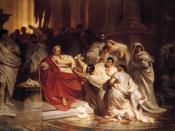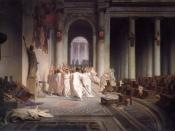The Use of Suspense in Julius Caesar
Suspense can be defined as the uncertainties the reader feels about what will happen next in a story, or in this case, a play. William Shakespeare incorporated in Julius Caesar three very suspenseful events on which the whole play depends.
The first suspenseful event of this play occurs when the conspirators join and discuss their reasons for assassination. Cassius feels that he is equal to Caesar, if not even better that him. Shakespeare builds suspense by using this statement made by Cassius: 'I was born free as Caesar.../we both have fed as well, and we can both / endure the winter's cold as well as he.' Then cassius tries to persuade Brutes to join in on the conspiracy by telling him that it would be honorable to assassinate Caesar. Cassius tells Brutes that the fate of Rome is in trouble with Caesar in power, which helps build suspense early in the play.
To convince Brutes conclusively, cassius forged letters and threw them into Brutus's window where he was sure to find them. Shakespeare wrote this statement: 'we will awake him and be sure of him. This is a very powerful statement that builds suspense because the reader most likely feels that Brutes will join in and want to assassinate Caesar, yet the reader is uncertain as to whether or not the plan will work. These events are very suspenseful as they lead up to the assassination of Caesar.
The next series of suspenseful events that foreshadow Caesar's assassination happen on a very unusual night. One night before Caesar's death there were many strange occurrences the foreshadows darkness in the future. A lioness gave birth in the streets, the dead rose from their graves, fiery worriers fought in the clouds so fiercely...


